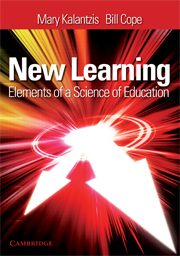Book contents
- Frontmatter
- Contents
- Preface
- Acknowledgements
- Part A Introduction – Changing Education
- Part B Contexts – Changing Conditions for Learning
- Part C Responses – Ways of Learning and Teaching
- 6 The nature of learning
- 7 Knowledge and learning
- 8 Pedagogy and curriculum
- 9 Learning communities at work
- Conclusion: futures of education
- References
- Index
7 - Knowledge and learning
from Part C - Responses – Ways of Learning and Teaching
- Frontmatter
- Contents
- Preface
- Acknowledgements
- Part A Introduction – Changing Education
- Part B Contexts – Changing Conditions for Learning
- Part C Responses – Ways of Learning and Teaching
- 6 The nature of learning
- 7 Knowledge and learning
- 8 Pedagogy and curriculum
- 9 Learning communities at work
- Conclusion: futures of education
- References
- Index
Summary
Overview
Learning is the way in which a person comes to know. Science is the work put into knowing that produces more reliable and trustworthy knowledge. The science of education is about the more focused ways of coming to know, and the ways these can be translated into effective teaching.
In this chapter we explore the nature of knowledge. We introduce a number of different ways of knowing and discuss the kinds of learning and education that typically come with these ways of knowing.
One cluster of ways of knowing we call ‘committed knowledge’. These ways of knowing operate as though they are the best way of knowing, at least for a particular purpose. The knowledge you have or create in these ways, its knowledge-makers believe, is as close to the ‘truth’ as you can get. Religious truths, for instance, are based on the idea that ultimate and absolute knowledge comes from a divine creator of the universe. Empirical truths derive from experimentation and observation, which produce hard-to-dispute ‘facts’. Rationalist truths are the product of the capacity of human reason to make sense of the world. Canonical truths base themselves in bodies of knowledge and important writings.
Another set of ways of knowing we call ‘knowledge relativism’. Epistemological or cultural relativism is the view that no way of knowing should claim itself to be superior to any other.
Information
- Type
- Chapter
- Information
- New LearningElements of a Science of Education, pp. 158 - 190Publisher: Cambridge University PressPrint publication year: 2008
